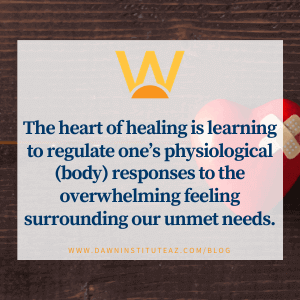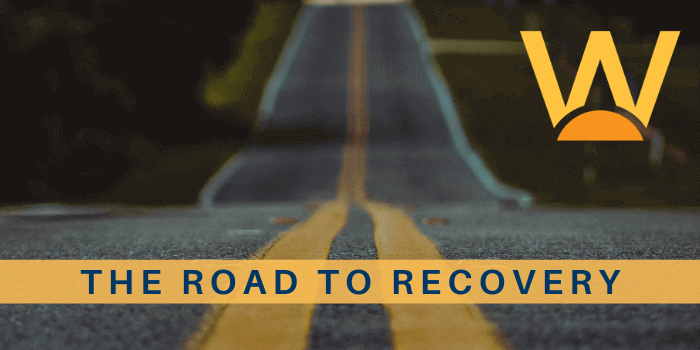About eight years ago I took my first trauma course. I was completely captivated by trauma work. I’ve since dedicated almost the entirety of my work as a therapist to understanding the impact of trauma on families and walking alongside them as they find healing. Even more so, my relationship with my husband and children received the greatest benefit as I began to understand the impact of environmental trauma in my own life. At the end of that first trauma class, all students were challenged to focus on learning self-regulation and reflecting on how their relationships changed over a year. So, let me share what I have learned.
Many people have unmet needs that are triggered around fears.
The heart of healing is learning to regulate one’s physiological (body) responses to these overwhelming feeling surrounding our unmet needs. Remember that vagus nerve I challenged you to look up a couple posts ago? Well, this nerve sends messages to almost every major organ and literally links our mind to our body. When we feel fear, for example, the vagus nerve sends messages to our heart to increase its speed in order to prepare us to fight or run.
So, when we “freak out” (for lack of better words), or when a fear around our unmet needs arises, lots of change happen within our bodies as our brain sends messages through our vagus nerve to the rest of our body. Our heart rate increases. Our muscles tense. Our breathing becomes short and rapid. Our digestive system becomes affected causing stomachaches or other digestive issues. The more we are in our survival brain (freak out mode), the more automatic it becomes.
Crazy side thought: think of children who were raised in persistently triggering environments. As adults, they will likely live primarily in their survival brain due to the simple fact that the more the survival brain is used the more automatic it becomes even to small triggering event. Ooooor consider fostering. If we are unable to regulate ourselves in regard to (foster) children’s emotional needs (externally we see behaviors from these needs), then we end up living in survival brain. The more we are survival brain with the children we care for, the more automatic it will become for us to go to that system with them even in small triggering events. I wonder how many of us fry out our systems because we have never learned to regulate our survival brain?

Back to the point. If we are stuck in freak out mode… or survival brain… how do we learn to regulate?
- Become aware of those physical responses within your own body when you feel survival brain coming on. When I made the decision to learn to regulate for my son when he first came into our home, the first step I took simply to notice signals my survival brain was sending throughout my body. My heart rate increased. My chest felt tight. My fists would clench. I would bite my upper lip. When I noticed my body doing this, I thought to myself, “here comes survival brain.” I didn’t even attempt to stop it initially. I simply became aware of it.
- Begin to notice when survival brain shows itself. “Oh, here comes my survival brain.”
- Once you have mastered the awareness, begin to relax those areas of your body that indicate survival brain is taking over. As I became aware of my body’s responses to the survival brain, I began to relax these areas before my 100% reactionary state began. As soon as I felt my fists clench, I would shake them out. My breaths would become shallow and rapid as my heart rate increased. In response, I would take deep diaphramic breaths (which is a great way to calm your heart rate). As my teeth sunk into my lip, I would release the grip. This was not a skill that came easily or quickly. Honestly, it took me probably 6 months to recognize all these bodily responses and then another 6 months to a year to begin to relax these areas.
- Work through the emotions of trigger once you’ve learned to regulate in spite of them. Even after I was able to calm my physical response to the triggers. I remained emotionally dysregulated, but now was in a place to begin to work on the big emotions. This was largely understanding and the talking myself through those unmet needs.
This work was hard and took about 8 years. It’s not an easy journey but truly changed my relationships. There are many days I suck and my unmet needs drive my actions. Each day though, I continue to work on addressing these unmet needs and to regulate through the triggering fears of them.

